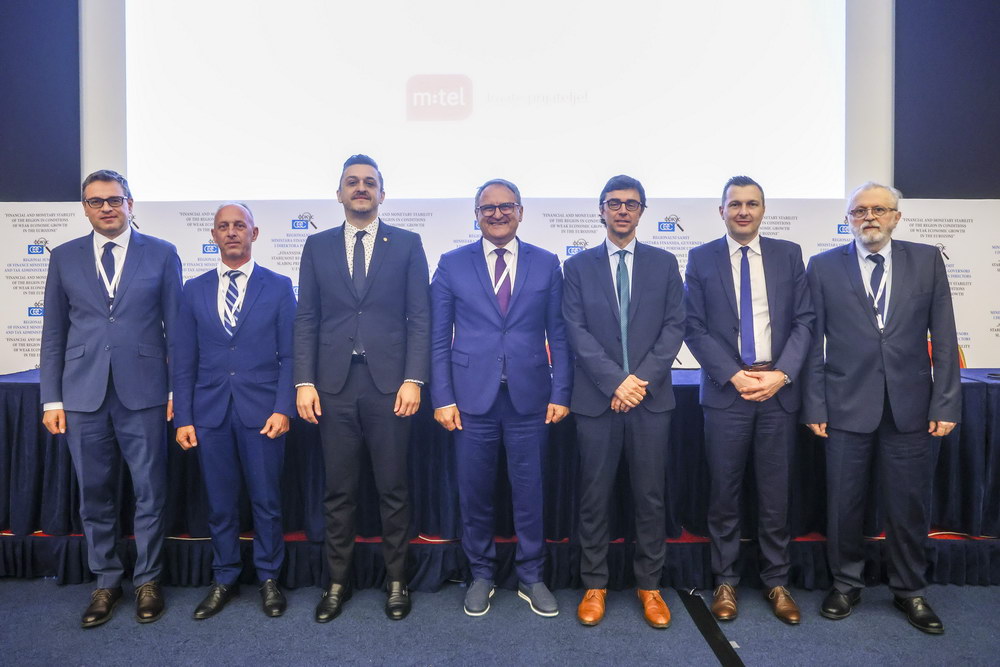The Summit is held mid-June in the Splendid Hotel in Bečići, under the patronage of the Ministry of Finance in the Government of Montenegro, the Central Bank of Montenegro and the Tax Administration of Montenegro. The Summit is attended by more than 200 participants – representatives of the ministries of finance, central banks and tax administrations from Serbia, Montenegro, Croatia, Republic of Srpska, Federation of Bosnia and Herzegovina, Kosovo, Albania and North Macedonia, bankers, businessmen and other financial experts from the region.
Owing to vehement support provided by our hosts, we expect this cooperation to expand to other areas of mutual interest. In addition to this, we hope that in the future organization of this event will substantially contribute to opening new prospects for the development of the entire region in more stable conditions.
The 11th Regional Summit of Finance Ministers, Governors and Tax Administration Directors held in Becici

The Regional Summit of Finance Ministers, Governors and Tax Administration Directors, organized by the Serbian Association of Economists, ended with participants bringing the attention to the need for regional cooperation and market integration, given the similarity of the problems in the region, ways to combat inflationary trends, and efforts to achieve sustainable growth. At the same time, for all countries, structural reforms remain the condition for faster growth and visible increase in the living standard.
A number of panelists concluded that the Western Balkans region has great opportunities for sustainable and long-term growth, in addition to the observable growth that is already being recorded short-term, where, in the entire region, special private investments and (still missing) critical mass in that sector are particularly important, including the reduction of the informal sector as well as much-needed digitalization.
At the panel “Responsible Fiscal Policy – A Prerequisite for Improving the Stability and Resilience of the Economy under Conditions of Poor Growth in the Eurozone”, it was concluded that structural reform, reduction of grey economy, and introduction of the digital euro are just some of the important challenges that the governments of the countries in the region have to work on in the upcoming period. In that final session, it was assessed that the governments in the region responded well to the negative shocks by injecting subsidy packages, but it was noted by many, in particular by the IMF representatives, that we should now put an end to that and let economies recover on their own to be able to respond to new crises.
Previously, at the session “How to Maintain the Stability of Prices and Banking System in Uncertain Times”, it was concluded that inflation is not a “done deal”, but that the worst period is behind us. Inflation in the eurozone has significantly dropped since April, but the differences across the EU countries are large. The decline in inflation started in October, but this is still not a sure sign that it has stopped, as it was affected by a surge in energy and food product prices. As for the question how to curb inflation, whether it is a thing of the past, and what measures are appropriate for our conditions, responses were offered by the heads of the central banks in the region.
The participants of both sessions agreed that a good coordination and cooperation of fiscal and monetary policymakers, i.e., governments and central banks, is required because only if they act in synergy one can speak of achieving sustainable growth indicators.
One-third of public investments are lost due to inefficiency and poor management, which is why planning, transparency and implementation remain key challenges that need to be worked on in order to achieve progress – this was the conclusion of the participants of the second panel “Assessment of the Efficiency of a Public Investment Management System” held in Becici on the first day of the Summit. It was generally viewed that it is good to have short-term successes, but that it is necessary that they be long-term as well, in order to achieve a sustainable growth rate. Panelists discussed planning a sustainable level of public investments, allocation of investments to sectors and projects, and ensuring productive public physical assets.
The reform and modernization of the tax administration, the fight against grey economy and tax evasion, the lack of quality human resources, but also digitalization, are all challenges faced by the tax administrations of the countries in the region.
This was the conclusion of the first panel “Reform and Modernization of the Tax Administration – Objectives, Goals and Limitations”. During the panel discussion, directors of tax administrations from the region addressed the key challenges of tax administrations, short- and mid-term priorities, the importance of efficient tax administration for the stability of public finances in uncertain times and preventing the growth of the grey economy, as well as regional cooperation and digitalization. They expressed the opinion that the lack of the staff potential and digitalization process are the biggest challenges faced by tax administrations in the region.
On the first day, the Summit was officially opened by the president of the Association of Economists of Serbia, Aleksandar Vlahovic who, in his opening address, summed up the complex economic situation which the countries of the Western Balkans, but of the eurozone as well, currently find themselves in. He stressed that we live in a time of geopolitical and geoeconomic context that is extremely complex and in a time of policrises – simultaneous crises with various causes and possible solutions.
Vlahovic concluded by underlining that structural reforms remain the condition for faster growth and visible increase in the living standard.
More details



